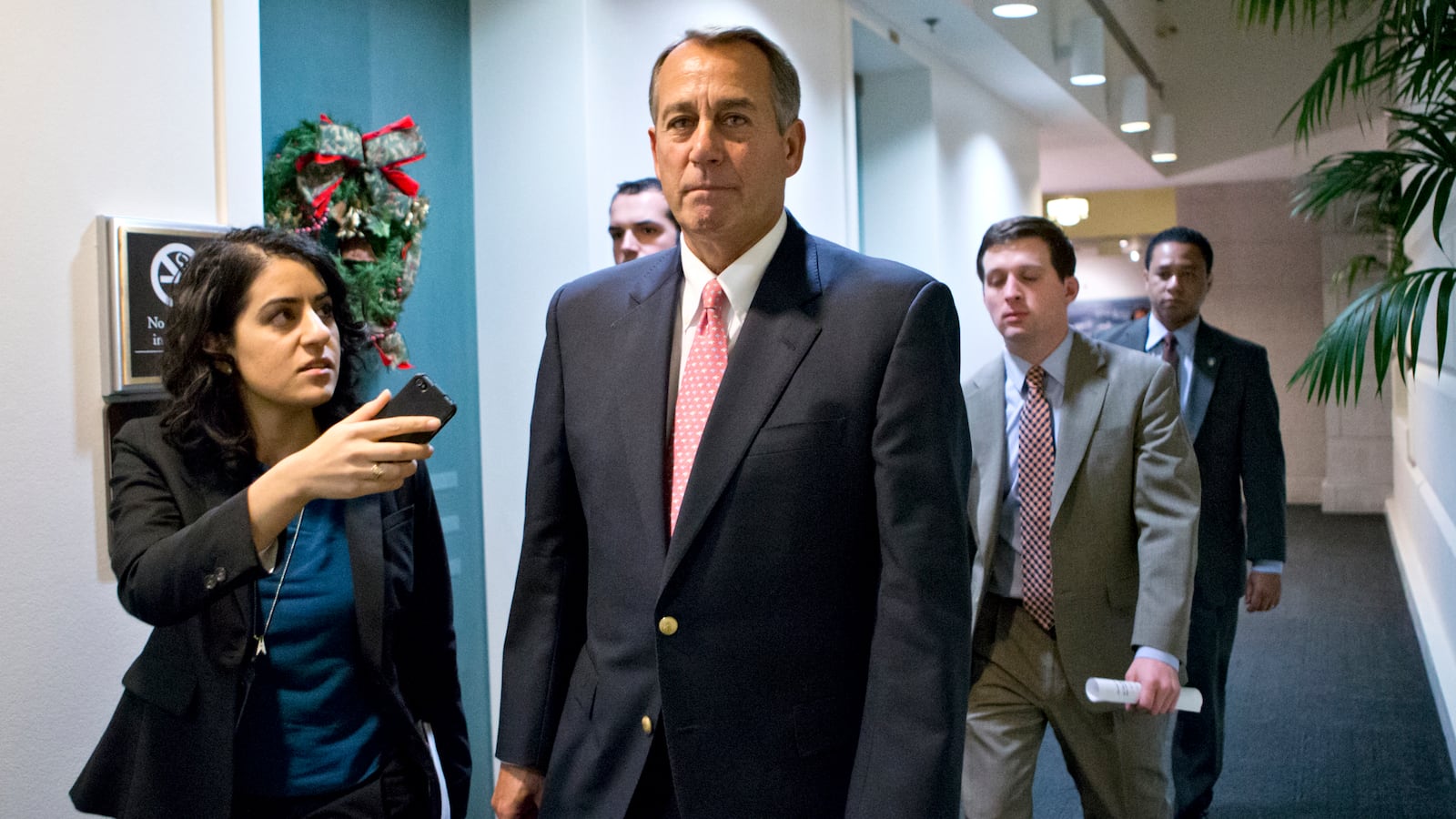A mad Washington scramble went into overtime in the predawn hours of New Year's Day as the Senate voted to avoid a tax hike on people making less than $400,000 even after the country had technically slid off the much-feared fiscal cliff.

While no one was breaking out the bubbly and party hats, this was as close to a Beltway triumph as our bitter and polarized politics is able to produce these days. And the bill does little in terms of spending cuts beyond kicking the can a bit down the road.
The 89 to 8 vote, on a deal brokered by Vice President Biden with Senate Republican leader Mitch McConnell, now must be approved by the House in the next two days. Given the margin in the Senate, where only five Republicans opposed the legislation, the pressure on John Boehner's team to push the ball over the finish line will be enormous. Yet substantial defections among conservative lawmakers are likely, which would force Nancy Pelosi to produce enough Democratic votes to pass the measure.
President Obama welcomed the Senate vote, and in purely political terms, the middle-of-the-night deal has to be seen as a partial victory for him. He got most Republicans to vote for a tax increase on the wealthy, a centerpiece of his campaign, after years of GOP intransigence on the issue. But Obama had to give ground too, especially on raising the income threshold for tax increases well above the $250,000 he has long supported, prompting some disaffection among his liberal allies.
The crucial sticking point was resolved with a classic congressional dodge. Unable to reach agreement on $110 billion in automatic spending cuts in domestic and defense programs, the Senate simply voted to delay those slashing cutbacks for two months, meaning the capital will be consumed by the same battle at the end of February—and maybe for years, in what is increasingly looking like the new normal.
A larger agreement on spending and taxes might have been reached weeks earlier, but the two sides were just too far apart, too entrenched, too wedded to waging partisan warfare rather than finding common ground.
This, in short, is the best they could do.
With the Senate leaders, Harry Reid and McConnell, signing off, tax breaks will be extended for individuals making less than $400,000 and couples more than $450,000, who will now pay the Clinton-era top rate of 39.6 percent, up from 35 percent. But some deductions and credits will phase out on incomes above $250,000, the president’s original threshold and one he touted throughout his race against Mitt Romney. The wealthiest Americans will pay higher capital-gains taxes as well.
The Senate also agreed to cancel a congressional pay raise, which would not have played well in this atmosphere.
Things looked grim on Monday after Obama, in a midafternoon speech from the White House, said a deal was “within sight,” only to have Boehner announce that the House would later adjourn for the day, making the cliff dive unavoidable.
The role of Joe Biden, who spent 30 years in the Senate, turned out to be crucial.
Biden and McConnell are veteran dealmakers who understand the strange rhythms of the Hill, including the fact that nothing gets done until the place comes up against a hard deadline—or, in the case of the vote around 2 a.m. Tuesday, after the deadline. On some level, the lawmakers had until Thursday, when the 113th Congress will be sworn in.
The president’s jocular appearance, in which he joked with a group of middle-class families, drew criticism that he was making light of a dire situation and poking at Republicans as Congress was struggling to cobble together an agreement.
The process appeared stuck until McConnell called Biden and said he needed to get involved, prompting the vice president's evening visit to Capitol Hill.
There was some disappointment among Democrats that Obama, who had the upper hand because the tax hikes were scheduled to kick in automatically, did not drive a harder bargain. But no deal could get done without both sides giving ground, and for a Republican Party with a fervent belief against raising taxes of any kind, Tuesday's vote was a tough pill to swallow.
The GOP may have more leverage in early 2013, though, as the focus of debate shifts to spending—though both parties, in truth, are wary about risking the voters' wrath by cutting back such programs as Medicare. By contrast, keeping tax cuts for most Americans is an easy vote.

There were elements on both sides that concluded it was in their self-interest to slide over the cliff rather than accept the political downside of a compromise. The White House believed it would have more leverage in passing a tax-cut bill for all but the wealthiest Americans once the bite is being taken out of everyone’s paychecks. Republicans believed they would regain leverage by February, as the administration again needs to raise the debt ceiling, which could trigger a replay of last year’s spectacle in which the government barely avoided a default. Treasury Secretary Tim Geithner says the feds have already hit the borrowing limit.
That means the often-tiresome debate will grind on, even with the fiscal cliff in the rearview mirror.
But the spectacle of negotiations without end has made Washington look ridiculous, and lawmakers on both sides of the aisle were embarrassed by the display of utter dysfunction. The polls show that much of the public is blaming the Republicans, at least for now. But if the process collapses in the House, Obama could be tarnished as well for failing to work his will on Congress.
It could be that the two parties will wrap this up quickly, making the technical failure to meet the self-imposed deadline a mere historical footnote. But the Obama Democrats and Boehner Republicans have proven time and again that they are capable of snatching defeat from the jaws of victory.






